American Revolution began 249 years ago: Here are 5 overlooked tourist spots on fight for independence
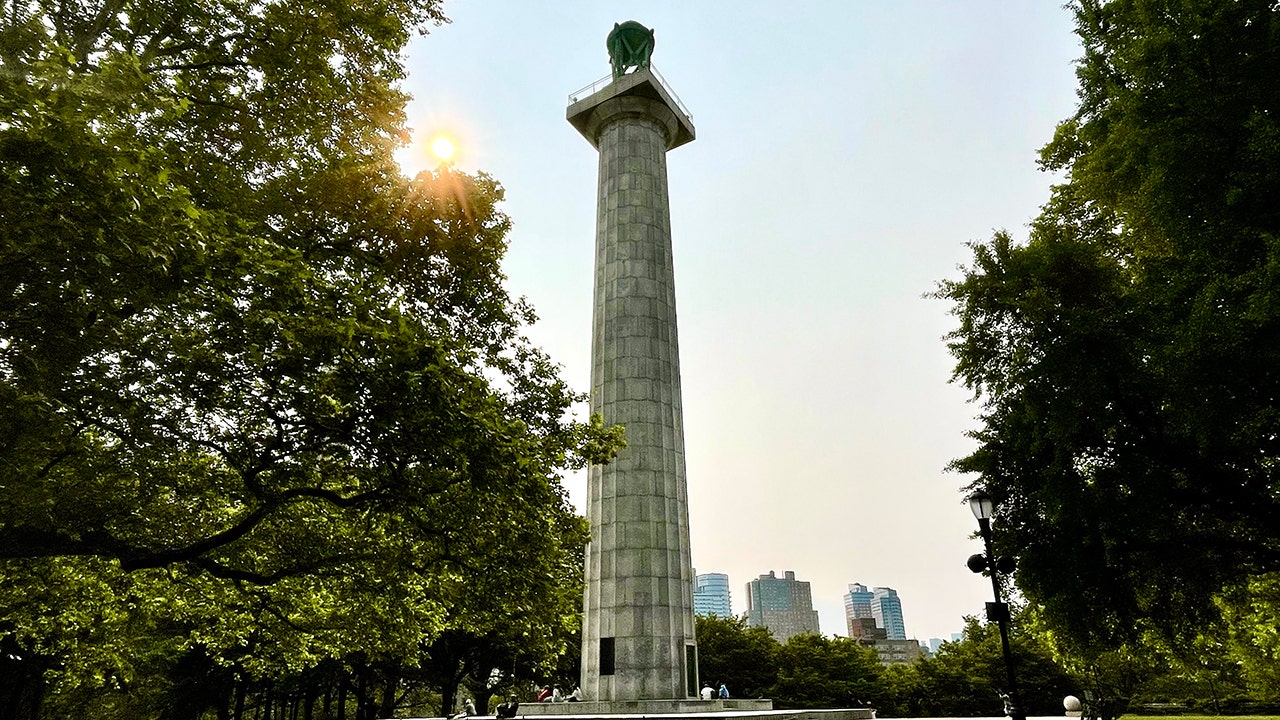
The grand events and oft-told tales of the American Revolution are easy to find among sprawling reverent battlefields and national parks.
George Washington’s Mount Vernon in Virginia, Independence Hall in Pennsylvania, and Minuteman National Historical Park in Massachusetts, where the American rebellion exploded into deadly revolution 249 years ago today, April 19, 1775, top any list of highlights in the nation’s fight for independence.
But historical secrets, haunting reminders and the lingering traces of legend help tell a complete story of any event, even one as long and deeply chronicled as the American Revolution.
MEET THE AMERICAN WHO NEVER FLINCHED IN THE FIGHT FOR INDEPENDENCE, ABIGAIL ADAMS
Here are 5 often overlooked locations that helped pave the way for American independence.
1. Bayley-Hazen Military Road, Vermont
Colonial troops invaded Quebec, Canada in the first winter of the American Revolution, with Benedict Arnold among its leaders.
Hundreds of his men died on the rough journey through the frozen New England wilderness.
A new road was needed to bring men and supplies to Canada – a mission that ultimately failed.
The Bayley Hazen Road in Vermont was conceived to deliver supplies to American troops fighting in Quebec in the American Revolution. It was never completed. Remnants of the road today offer haunting reminders of the fight for American independence. Sign in Peacham, Vermont. (Kindra Clineff/Alamy Stock Photo)
“Proposed and started in 1776 by Colonel Jacob Bayley, continued in 1779 and later abandoned by General Moses Hazen, the road — and what remains of it — extends from Wells River in a northwesterly direction to what is now known as Hazen’s Notch,” reports the website CrossVermont.org.
“Small details, historical markers, grave sites and monuments that still recall the events of long ago may escape the eye when barreling along in a car.”
The warpath carves a lane through some of the most rural parts of the Lower 48 states. It is best explored by bicycle, the website adds.
“Small details, historical markers, grave sites and monuments that still recall the events of long ago may escape the eye when barreling along in a car but will not be missed by bike.”
2. French Cemetery, Yorktown, Virginia
Fifty unknown soldiers of France who gave their lives for the cause of American liberté are buried near this Yorktown battlefield.
Among other lessons, the graves are reminders of 50 French mothers — 50 French families — who never knew the fate of their son, father or brother when he shipped overseas to fight the British in North America.
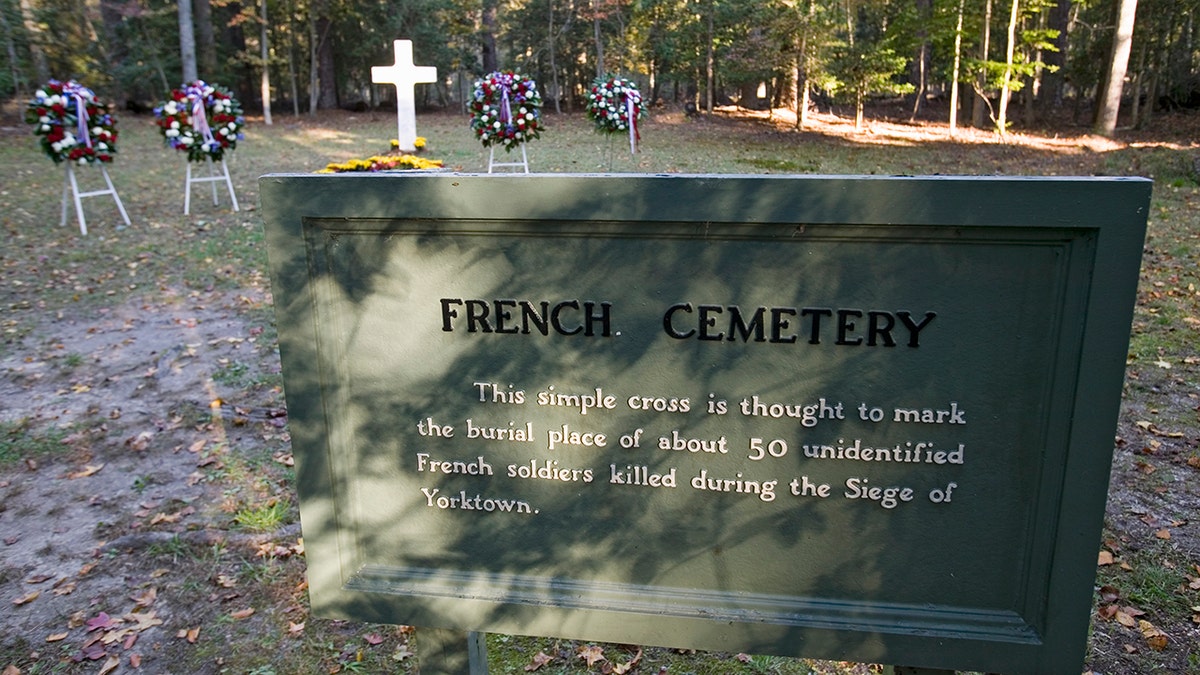
This is the French Cemetery where 50 French soldiers who lost their lives in the Siege of Yorktown, 1781, are buried. Colonial National Historical Park, Historical Triangle, Virginia. (Joe Sohm/Visions of America/Universal Images Group via Getty Images)
The 50 unknowns represent the 8,000-10,000 Frenchmen who fought at Yorktown, the final American victory in the war that forged the new United States.
Those thousands of men, supported by 29 French warships, and paired with years of American resolve, forced the British to surrender and admit defeat at Yorktown in October 1781.
Several other historical markers are within walking distance, including those for French Artillery Park and Washington’s headquarters, and a tribute to the leading French military officer in Virginia, Comte de Rochambeau.
3. Nathan Hale execution site, Manhattan, New York
“I only regret that I have but one life to lose for my country,” Hale, just 21, reportedly uttered with stiff lip as he was hanged by the British for treason on Sept. 22, 1776 in Manhattan.
Dense urban development paved over the actual site of Hale’s death, but a bronze plaque visible from the sidewalk offers the only reminder of this seminal moment in patriotic defiance.
It’s located on Third Avenue, between East 65th and East 66th Streets, on the Upper East Side.
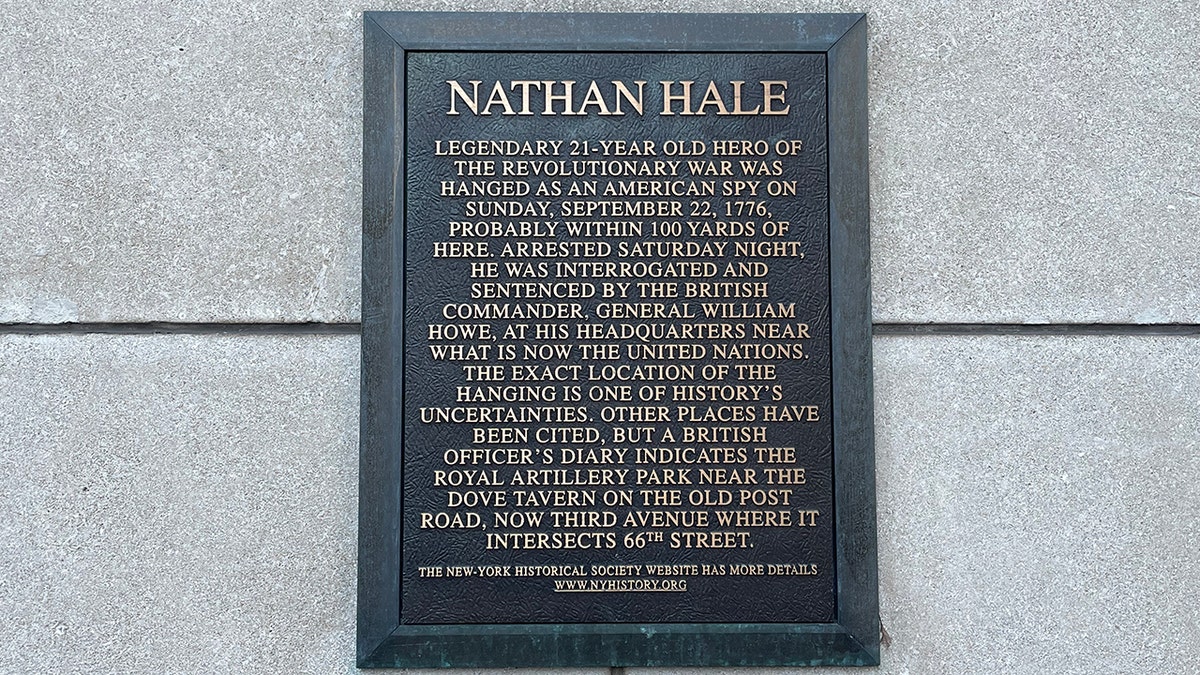
American patriot Nathan Hale reportedly uttered, “I only regret that I have but one life to lose for my country,” before the captured spy was hanged by the British on Sept. 22, 1776 in Manhattan. (Kerry J. Byrne/Fox News Digital)
Little more than a photo-op stop, it offers an opportunity to explore some of the other interesting Revolutionary War sites in Manhattan — which was occupied by the British throughout most of the war.
Those interesting sites include the Alexander Hamilton Grange, a farmhouse in the middle of the city’s concrete caverns that the Founding Father built just before he was killed in a duel with Vice President Aaron Burr.
“I only regret that I have but one life to lose for my country.”
Also, Fraunces Tavern is where George Washington delivered his farewell speech to his officers after the British final left New York City.
It’s a real tavern today that doubles as a museum of early American history.
4. Prison Ship Martyrs Monument, Brooklyn, New York
This powerful monument in a verdant park offers chilling testimony that American independence was purchased by patriots at the price of hideous human suffering.
The 150-foot-tall Doric column at Fort Greene Park towers over the footprint of a colonial garrison of the American Revolution.
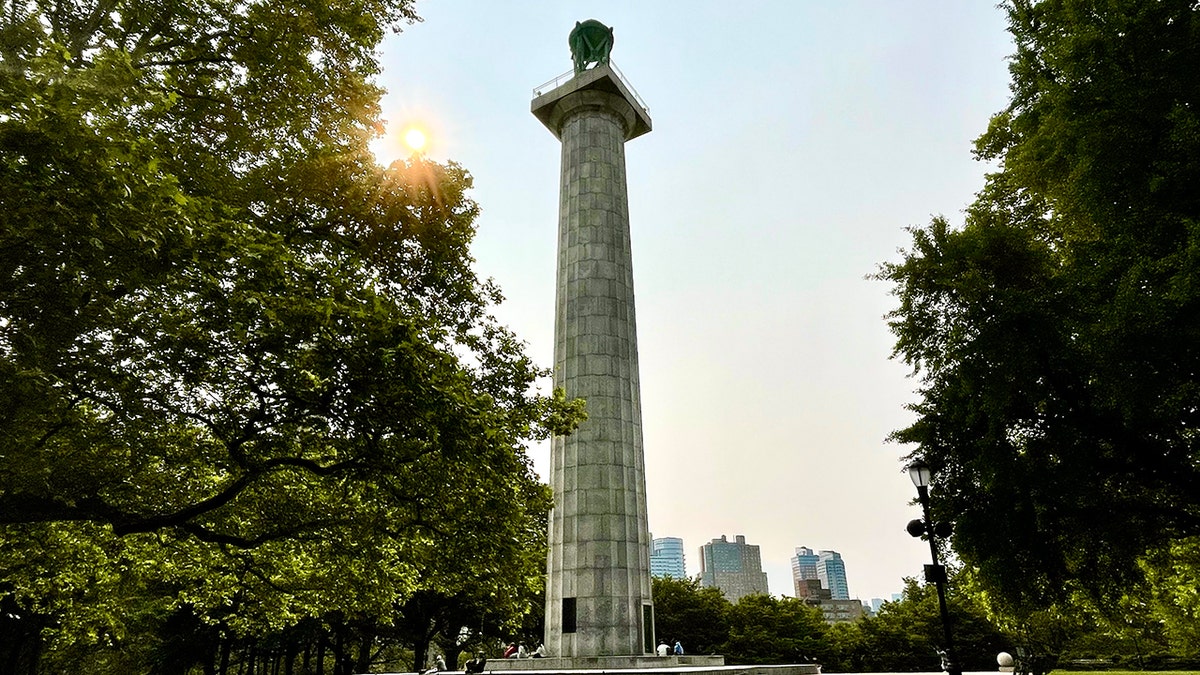
The Prison Ship Martyrs Monument in Brooklyn was dedicated on Nov. 14, 1908 in a ceremony attended by President William Howard Taft. (Kerry J. Byrne/Fox News Digital)
It’s dedicated to the estimated 11,500 American soldiers, sailors and privateers who died in hellish conditions aboard British prison ships on the nearby East River during the fight for nationhood.
A number of these patriots are buried in a crypt beneath the monument — the identities of many known only to God.
MEET THE AMERICAN WHO ROWED WASHINGTON ACROSS THE DELAWARE ON CHRISTMAS: SAILOR-SOLDIER JOHN GLOVER
“This is hallowed ground,” Brooklyn native and self-professed patriot Eddie Desmond told Fox News Digital.
“This is America’s original tomb of the unknown soldiers.”
5. Swamp Fox statue/Marion County Museum
Francis Marion, the legendary “Swamp Fox” of South Carolina, has fueled legend and tributes for nearly 250 years.
CLICK HERE TO SIGN UP FOR OUR LIFESTYLE NEWSLETTER
Most notably in recent times, he’s among the inspirations for the movie “The Patriot.” Mel Gibson plays the role of a colonial American father who fights the British from the misty swamps of the American south.
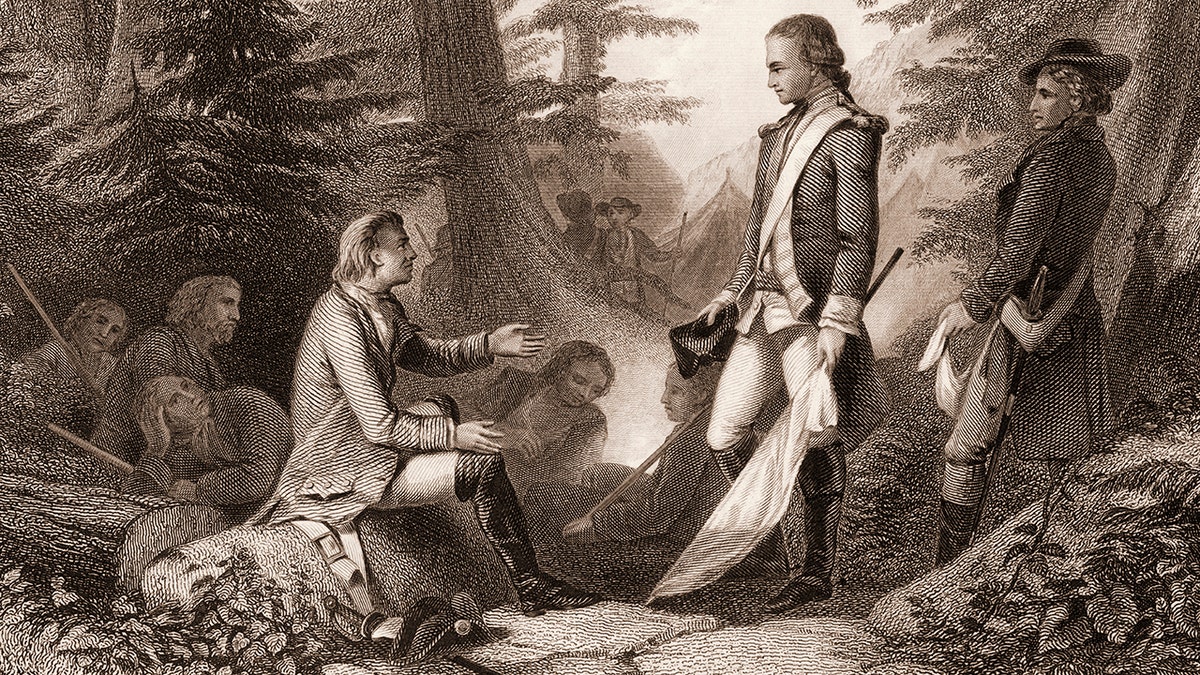
Illustration of Francis Marion (1730s-1795), an American military officer nicknamed the Swamp Fox, seated, greets a British officer, mid-to-late 18th century. (Stock Montage/Getty Images)
“Using tactics he learned from the Cherokee during his time as a soldier in the French and Indian War 20 years prior, Marion and his men outwitted countless British troops right from the swamps along the Pee Dee and Santee Rivers,” reports the website of the Pee Dee Tourism Commission.
CLICK HERE TO GET THE FOX NEWS APP
The best place to get a picture of the man behind the legend is at the museum of the South Carolina county that bears his name.
The Marion County Museum includes a permanent exhibit of the Swamp Fox, while the highlight of a visit for many is a photo with the nearby larger-than-life statue of the American war hero.
For more Lifestyle articles, visit www.foxnews.com/lifestyle.
Related
‘Mad as hell’ Canadians cancel US travel en masse as…
The next front in Canada’s trade war against the US is being waged in airports, gas stations and gift shops, as Canadians cancel their American vacations en
‘Mad as hell’ Canadians cancel US travel en masse as…
The next front in Canada’s trade war against the US is being waged in airports, gas stations and gift shops, as Canadians cancel their American vac










